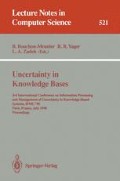Abstract
We present an application of fuzzy logic with linguistic quantifiers, mainly of its calculus of linguistically quantified propositions due to Zadeh, in inductive learning under imprecision and errors. The classification into the positive and negative examples is allowed to be to a degrees (of positiveness and negativeness), between 0 and 1. The value of an attribute in an object and in a selector need not be the same allowing for an inexact matching. Errors in the data may exist though their number may be not precisely known. A new inductive learning problem is formulated as to find a concept description which best satisfies, say, almost all of the positive examples and almost none of the negative ones.
Preview
Unable to display preview. Download preview PDF.
References
Bergadano F. and R. Bisio (1988) Constructive learning with continous — valued attributes. In B. Bouchon, L. Saitta and R.R. Yager (Eds.): Uncertainty and Intelligent Systems, Springer — Verlag, Berlin — Heidelberg — New York, 154–162.
Bouchon B., L. Saitta and R.R. Yager (1988) Uncertainty and Intelligent Systems [Proceedings of the Second International Conference on Information Processing and Management of Uncertainty in Knowledge — Based Systems (IPMU' 88); Urbino, Italy, 1988], Springer — Verlag, Lecture Notes in Computer Science, Berlin — Heidelberg — New York.
Cohen P.R. and E.A. Feigenbaum (1982) The Handbook of Artificial Intelligence. Vol. 3. Kaufmann, Los Altos.
Dietterich T.G. et al. (1981) Learning and inductive inference. In P.R. Cohen and E.A. Feigenbaum (Eds.): The Handbook of Artificial Intelligence, Kaufmann, Los Altos, 323–525.
Gemello R. and F. Mana (1988) Controlling inductive search in RIGEL learning system. In B. Bouchon, L. Saitta and R.R. Yager (Eds.): Uncertainty and Intelligent Systems, Springer — Verlag, Berlin — Heidelberg — New York, 171–178.
Kacprzyk J. (1987) Towards ‘human — consistent’ decision support systems through commonsense — knowledge — based decision making and control models: a fuzzy logic approach. Computers and Artificial Intelligence 6, 97–122.
Kacprzyk J. and R.R. Yager (1985) Emergency — oriented expert systems: a fuzzy approach. Information Sciences 37, 147–156.
Michalski R.S. (1973) Discovering classification rules using variable — valued logic system VL1. Proc. of the 3rd Int. Joint Conference on Artificial Intelligence (IJCAI), 162–172.
Michalski R.S. (1980) Pattern recognition as rule — guided inductive inference. IEEE Trans. on Pattern Analysis and Machine Intelligence PAMI-2, 249–361.
Michalski R.S. (1983) A theory and methodology of inductive learning. In R.S. Michalski, J. Carbonell and T. Mitchell (Eds.): Machine Learning. Tioga Press, Palo Alto, 83–133.
Mitchell T. (1982) Generalization as search. Artificial Intelligence 18, 203–226.
Quinlan J.R. (1983) Learning efficient classification procedures and their applications to chess and games. In R.S. Michalski, J. Carbonell and T.M. Mitchell (Eds.): Machine Learning. Tioga Press, Palo Alto, 463–482.
Raś Z.W. and M. Zemankova (1988) Learning driven by the concepts structure. In B. Bouchon, L. Saitta and R.R. Yager (Eds.): Uncertainty and Intellegent Systems, Springer — Verlag, Berlin — Heidelberg — New York, 193–200.
Shaw M.J. (1987) Applying inductive learning to enhance knowledge — based expert systems. Decision Support Systems 3, 319–322
Yager R.R. (1983) Quantifiers in the formulation of multiple objective decision functions. Information Sciences 31, 107–139.
Zadeh L.A. (1983) A computational approach to fuzzy quantifiers in natural languages. Computers and Mathematics with Applications 9, 149–184.
Author information
Authors and Affiliations
Editor information
Rights and permissions
Copyright information
© 1991 Springer-Verlag Berlin Heidelberg
About this paper
Cite this paper
Kacprzyk, J., Iwański, C. (1991). Inductive learning from incomplete and imprecise examples. In: Bouchon-Meunier, B., Yager, R.R., Zadeh, L.A. (eds) Uncertainty in Knowledge Bases. IPMU 1990. Lecture Notes in Computer Science, vol 521. Springer, Berlin, Heidelberg. https://doi.org/10.1007/BFb0028129
Download citation
DOI: https://doi.org/10.1007/BFb0028129
Published:
Publisher Name: Springer, Berlin, Heidelberg
Print ISBN: 978-3-540-54346-6
Online ISBN: 978-3-540-47580-4
eBook Packages: Springer Book Archive

